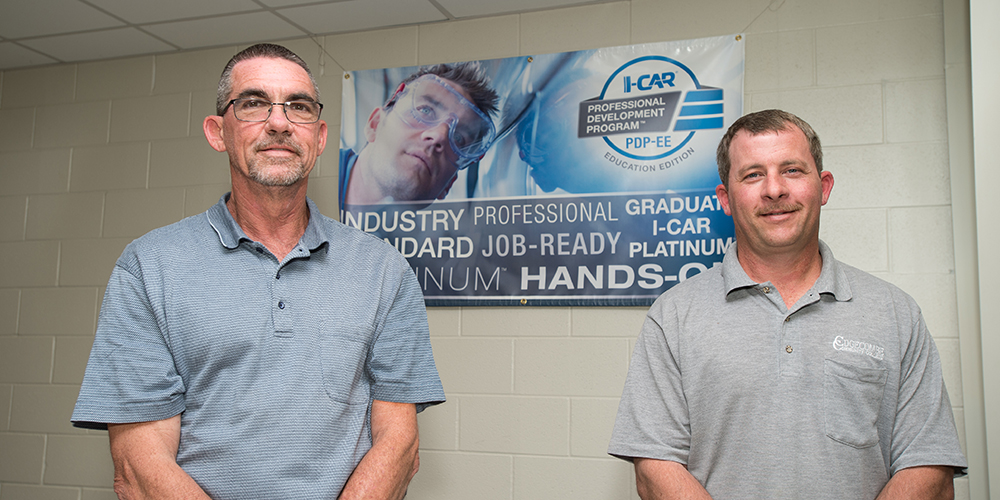ECC Offering New Auto Body Certifications

This fall semester, Edgecombe Community College will be the first community college in the Edgecombe area to offer students I-CAR certifications through its Collision Repair and Refinishing Technology program. Bud Speight (left), program chair, and Kevin Strickland, instructor, will lead the advanced training.
A quick internet search shows that auto body repair and collision jobs are readily available both locally and nationwide. With advanced certification offered at Edgecombe Community College, job seekers can write their own ticket.
According to Bud Speight, program chair of Collision Repair and Refinishing Technology at ECC, “Our graduates are guaranteed employment if they walk out of here with a Pro Level 1 Platinum certification. And that certification is going to get them higher wages.”
This fall, ECC will be the first community college in the Edgecombe area to offer students this advanced certification through the College’s I-CAR curriculum. I-CAR, Inter-Industry Conference on Auto Collision Repair, is an international organization that provides information, knowledge, and skills required to perform complete, safe, and quality repairs.
I-CAR serves all segments of the collision repair industry: collision repair; insurance; original equipment manufacturers; education, training and research; tools, equipment and supply; and related industry services.
This summer, Speight completed extensive training to become a certified Pro Level 1 Platinum instructor. ECC Collision Repair instructor Kevin Strickland anticipates earning instructor certification by the start of fall semester.
“I-CAR offers numerous certifications, and by merging their curricula with what is already in place here at ECC, our students will earn industry-standard I-CAR certifications while they achieve ECC credentials,” Speight explains.
The College’s Collision Repair and Refinishing Technology program is unique in the region. The closest similar programs are at Wayne Community College and Fayetteville Technical Community College.
Students in the Collision Repair and Refinishing Technology program at ECC can opt for a two-year degree, one-year diploma, or numerous certificates. The program is housed in a 7,000-square-foot state-of-the-art facility that features virtual reality technology, a dustless sanding system, and a compartmentalized sandblaster.
Part of the overall goal of the program is for students to gain I-CAR certifications in their classes. As Speight explains, “For every certification, students earn I-CAR points. They carry these points with them when they go to work at auto body shops, and the shops have to reach a certain level of I-CAR points among their technicians in order to gain insurance work.”
Auto body shops also may benefit by sending their technicians to ECC for I-CAR training and certifications.
Speight says that his Collision Repair and Refinishing Technology Advisory Board was instrumental in the College’s decision to seek I-CAR credentials. ECC advisory boards are in place for about thirty ECC academic programs. The boards consist of professional leaders and community members who are experts in their field.
“My advisory board has been pushing for I-CAR, and I’m grateful for their guidance,” he explains. “They understand better than anyone the demands of the industry since they work in it every day.”
In addition to ECC credentials, students can earn Pro Level 1 Platinum certification in non-structural repair and painting and refinishing. “To reach the platinum level, students will have multiple I-CAR certifications,” Speight says.
According to the Bureau of Labor Statistics, auto body and repair employment is expected to grow by 8 percent over the next seven years. Presently, technicians earn about $41,000 a year on average, and Speight says that salary can double or more with advanced I-CAR certifications.
“Body shop owners tell me that if I can provide graduates with platinum certification, they’ve got a job,” Speight adds. “Our graduates can make very good money, if they put in the effort.”
